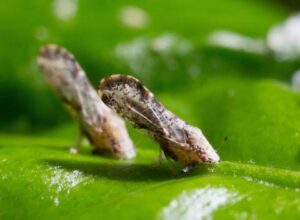
BioFlora Gets Stunning Results in Field Trials of HLB Infected Trees
By Patrick Cavanaugh, Editor
The Asian Citrus Psyllid vectors huanglongbing or HLB. The psyllid feeds on the leaves of the citrus tree, and the HLB bacteria is inoculated into the tree’s phloem. As the bacteria multiples, it clogs the phloem, and the tree slowly dies.
BioFlora, a company based in Goodyear, Ariz., has developed a unique citrus program that is getting stunning results from field trials conducted on HLB infected trees. In collaboration with two prominent universities, Bioflora conducted a three-year study on grapefruit trees, the most susceptible citrus species. Initial greenhouse trials were conducted at a government research facility in Florida, and field trials and analysis were performed at two prominent universities with current on going trials with growers in Florida.
A Lake County, FL lemon grower, whose grove experienced the turnaround, noted that he could see trees with significant growth within two initial applications. “Leaf drop stopped after the program was initiated, and the trees had good color and are growing vigorously. I can see an improvement from month to month,” the grower said.
“Over a three-year study on HLB in grapefruits, we were amazed at the results from the four programs (consisting beneficial bacteria isolates, biostimulants, and nutrition, including macro and micro-elements) that we initiated. While we continue our analysis, these diverse programs appeared to have a multirole synergistic effect on HLB trees which also seems to show beneficial yield and fruit quality, but one program (program #2) seems to have the most dramatic effect (Manuscript in Progress)”. said Srinivas Makam, Ph.D., Molecular and Microbiologist for BioFlora’s Integrated Life Science Research Center.
“Studying HLB at the genetic level is providing us with a tremendous amount of information which we are combing through on how HLB functions in the plant phloem and plant’s defense mechanisms. Those plant defense mechanism (systemic resistance, induced or acquired to be determined) we hypothesize, seems to be activated to help the tree cope with HLB .” In addition to advanced molecular assays, leaf samples were analyzed using electron microscopy and a marked reduction in cLas population was observed in trees treated with program #2, with some initially infested leaves showing no bacterial presence. The key reason for this response appears to be the continued timely application of the citrus program”, Makam explained.
“Currently, BioFlora has a lemon orchard trial in Lake County, Florida, infected with HLB. Within five or six months, HLB infected trees are responding to the citrus program very positively,” noted Makam.
BioFlora believes in the partnership between plants and soils, transforming plant health with cutting-edge bio-stimulants that enhance plant defenses, address nutrient deficiencies, and unproductive soils.
Citrus tree health and nutrition has been the focus of the HLB trial. BioFlora programs bring organic and sustainable solutions that growers can implement immediately in the fight against HLB infections.









